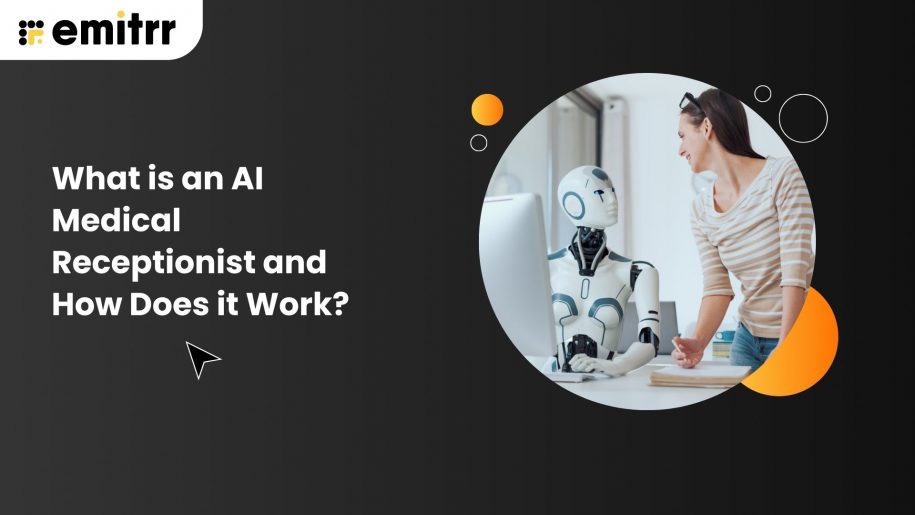Introduction to AI Receptionist for Medical Office
Managing a medical office is no easy task, especially when it comes to handling the front desk. This is why a lot of practices are inclining towards AI Medical Receptionist—a smart, tech-driven solution that is transforming how medical offices operate. Imagine a virtual receptionist who never tires, consistently handles incoming calls, schedules appointments, and provides patients with relevant information—all without the need for a human to intervene at every step.
For example, consider a small family clinic struggling with missed calls during peak hours. With an AI healthcare receptionist like Emitrr, the clinic can automate these interactions, ensuring no call goes unanswered and appointments are scheduled seamlessly.
For small business owners in the healthcare space, this technology offers a way to optimize the flow of operations while ensuring patients get the attention they deserve. However, understanding exactly how an AI receptionist can work in a medical office might seem a bit overwhelming at first. With so many different options and features available, it’s easy to get confused.
This blog is here to clarify what medical receptionist AI is and how it can benefit your practice, making it a must-read if you’re considering adopting this technology for your office.
What is an AI Medical Receptionist?
An AI medical receptionist is a virtual assistant powered by artificial intelligence designed to manage tasks typically handled by a human receptionist in a medical office. It can automate appointment scheduling, handle phone calls, answer patient questions, and provide other administrative support—all without the need for direct human involvement. This technology is transforming how medical offices operate by reducing manual workload and improving efficiency.
When comparing medical receptionist AI to traditional front desk staff, the main difference lies in the way tasks are managed. A human receptionist usually handles a wide range of responsibilities, often juggling multiple tasks simultaneously. In contrast, an automated medical receptionist can perform repetitive, time-consuming tasks consistently without fatigue. While a human receptionist can provide personalized attention, an AI system can handle a large volume of requests at once, ensuring that no task is missed or delayed.
Here’s a direct comparison to show the key differences between an automated medical receptionist and a human receptionist:
| Use Case | AI Medical Receptionist | Human Receptionist |
| Handling Repetitive Queries | Efficiently responds to frequent, simple queries 24/7 with no fatigue | Provides personalized responses, but may take more time and effort |
| Unexpected Surge in Patient Volume | Can handle high call volumes or appointment requests simultaneously ensuring no one is missed | Might struggle to manage multiple calls or tasks at once. |
| Tracking Patient Follow-Ups | Automatically tracks follow-up schedules based on patient data, reducing human error | Tracks follow-ups manually, requiring attention and memory, which can result in oversight |
| Personalized Patient Instructions | Delivers consistent and accurate instructions, customized based on patient information recorded | Tailors instructions to individual needs, but may vary in accuracy or consistency |
| Handling Patient Complaints | Provides a structured process to manage complaints, collects data for follow-up action | Resolves complaints with empathy and emotional intelligence, but may vary in approach |
| Language Diversity | Supports multiple languages at once, providing wider access to diverse patients | May require additional bilingual staff to meet the language needs of patients |
| After-Hours Support | Operates 24/7, ensuring continuous support without interruptions | Available only during working hours, requiring overtime or staffing adjustments for after-hours support |
| Emergency Situations | Quickly guides patients to emergency procedures or alerts appropriate staff based on preset protocols | Assesses the situation and directs patients, but may take longer and rely on judgment |
| Patient Interaction | Interacts with patients through voice or chat, handling high-volume tasks efficiently | Provides empathetic, personalized care, offering a comforting human touch in patient interactions |
| Integration with Tech | Seamlessly integrates with electronic health records (EHR) and other systems, optimizing workflow | Requires training and manual input to integrate and effectively use new technologies |
Download professional voicemail greeting scripts made for medical offices. Save front desk time and ensure patients always hear the right message.
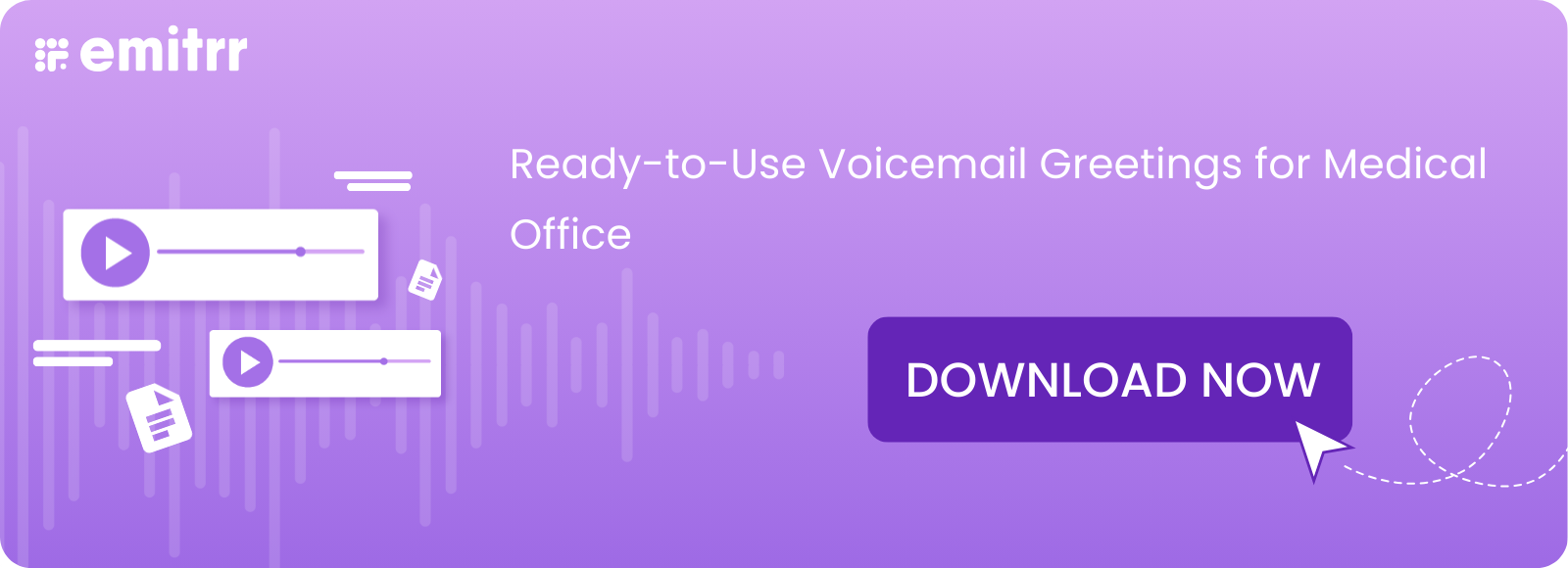
Why You May Need a Medical Office Virtual Receptionist?
If you’re facing the following challenges and aiming to improve the efficiency and effectiveness of your medical office, then a medical office virtual receptionist could be just what you need. Let’s take a closer look at these common issues and how this technology can help resolve them.
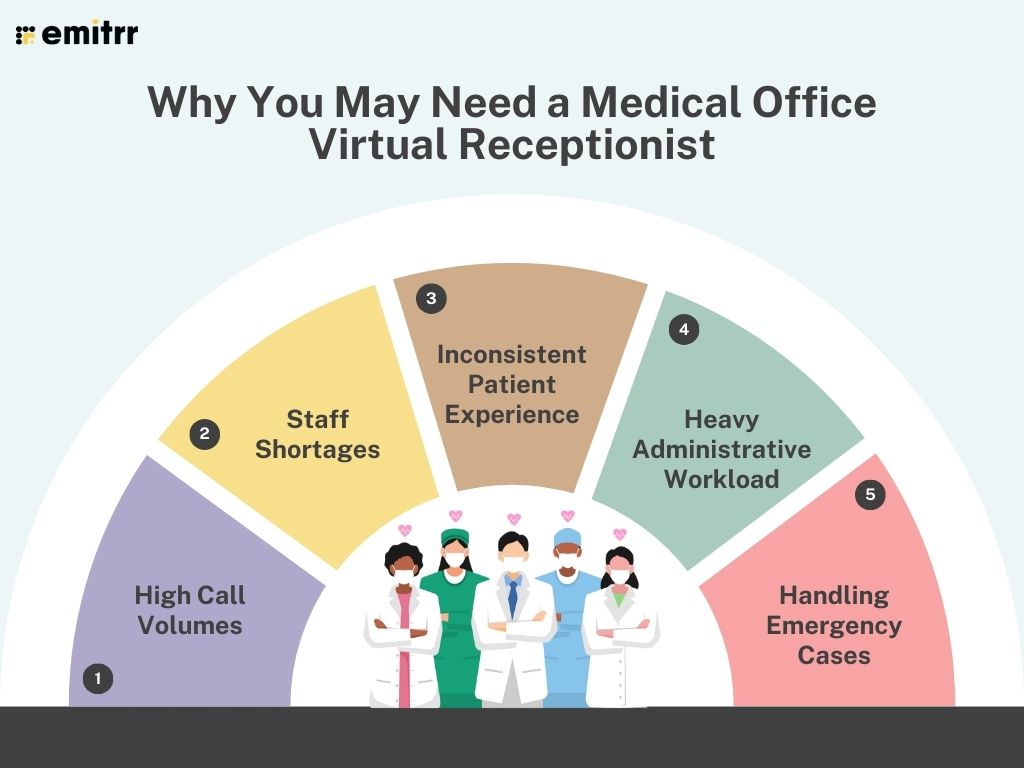
High Call Volumes
Challenge: Managing numerous patient calls during peak hours can lead to long wait times and missed inquiries, both of which negatively affect patient satisfaction. As your office grows or faces busier periods, your reception staff may struggle to handle the increasing volume of calls, leading to delays or missed appointments.
Goal: Achieve 24/7 availability for patient inquiries and medical appointment scheduling, reducing wait times and ensuring no call is missed.
With best virtual medical receptionist, your office can manage high call volumes effortlessly. AI technology can handle patient calls around the clock, ensuring that no matter how busy your practice gets, patients can still reach out to schedule appointments or ask questions. The AI can also provide immediate responses to frequently asked questions, further streamlining the process and reducing patient wait times. This ensures a smooth, uninterrupted flow of communication and helps enhance patient satisfaction, which is vital for any medical office.
Staff Shortages
Challenge: Finding and retaining skilled reception staff can be challenging, particularly in smaller practices. Staff shortages, whether due to turnover, sick days, or high demand for talent, can cause significant disruptions in the day-to-day operations of your office.
Goal: Minimize dependency on human staff by automating front desk operations, ensuring uninterrupted service even during staff shortages.
An AI medical receptionist can step in when your human staff is unavailable or stretched thin. It works seamlessly to automate front desk operations, from answering calls to scheduling appointments. This reduces the pressure on your staff and ensures that your office runs efficiently even during times when you’re facing a staffing shortage. By reducing the dependence on human receptionists, your office can continue offering services without disruption, even in the face of turnover or unforeseen absences.
Inconsistent Patient Experience
Challenge: Variations in service quality can arise due to factors like human fatigue, turnover, or inconsistent training. For instance, when receptionists are overworked or stressed, it can lead to rushed interactions or mistakes in handling appointments, which can negatively impact the patient experience.
Goal: Provide consistent, high-quality interactions through automated, standardized responses.
One of the major benefits of a virtual front desk for medical practice is its ability to deliver consistent and accurate interactions with patients. Whether it’s scheduling an appointment, answering a question, or confirming details, AI offers standardized responses that eliminate the risk of human error caused by fatigue, forgetfulness, or inconsistency. With AI, every patient gets the same level of care and attention, ensuring that your practice maintains a high-quality, professional experience for every patient, every time.
Heavy Administrative Workload
Challenge: Administrative tasks like scheduling appointments, sending reminders, data entry, and other routine tasks can be time-consuming for your staff. This detracts from the time they can spend on more critical tasks, such as providing patient care or managing complex queries.
Goal: Streamline administrative processes by automating routine tasks, freeing up staff to focus on patient care and complex issues.
Automated medical receptionists are adept at handling repetitive administrative tasks such as scheduling, confirming appointments, and sending reminders. By automating these tasks, the AI ensures they are completed accurately and on time, without requiring constant human oversight. This allows your staff to focus on more complex and important duties, such as assisting patients directly or managing more intricate patient needs. Over time, this automation can lead to increased productivity, reduced stress on your team, and ultimately, better patient care.
Handling Emergency Cases
Challenge: Identifying and prioritizing emergency patient cases in a busy office can be challenging, especially when human receptionists are handling numerous incoming calls. Emergency cases may not be immediately recognized, leading to delays that could negatively affect patient outcomes.
Goal: Implement intelligent call routing and prioritization to address urgent cases promptly, enhancing patient safety.
A medical office virtual receptionist can be programmed to recognize urgent calls and automatically prioritize them. For example, if a patient calls with symptoms that suggest an emergency, the AI can route the call directly to the appropriate healthcare provider or emergency service. This not only ensures that emergencies are dealt with swiftly but also reduces the risk of errors or delays caused by human judgment. With AI, urgent cases are immediately flagged, helping to ensure timely interventions and improving patient safety.

But You Might Not Need a Medical Office Virtual Receptionist If..
While virtual medical receptionists provide numerous advantages, there are certain scenarios in which adopting this technology might not be necessary or beneficial for your practice. Consider the following points:
1. If Your Practice Prioritizes a Highly Personal Touch in Patient Interactions
Reason: Some patients may prefer speaking with a human who can provide empathetic responses and nuanced understanding.
For practices where the personal connection between patients and staff is paramount, an AI medical office assistant might not align with the overall approach to care. While AI is efficient, it lacks the emotional intelligence and empathetic touch that human receptionists offer. For example, some patients might feel more comfortable discussing sensitive health matters or concerns with a human receptionist who can understand and respond accordingly. If your practice focuses on building strong, personal relationships with patients, then an AI medical office assistant might not fully capture this experience.
2. If Your Practice Has a Well-Staffed Front Desk Team
Reason: Adding medical receptionist service may not significantly improve efficiency if your current system already meets your operational needs.
If your office already has a well-trained, efficient front desk team that can manage patient calls, scheduling, and other administrative tasks without significant strain, the addition of an AI medical receptionist may not offer a substantial improvement. In this case, your team might already be handling tasks effectively, and implementing AI could add complexity or cost without providing enough additional value.
3. If Your Practice Has Minimal Administrative Tasks
Reason: The incremental benefits of a medical receptionist service might be negligible in an already optimized workflow.
For smaller practices that have streamlined administrative processes, such as those with few patients or minimal scheduling requirements, the need for an AI receptionist for medical practice may not be as pressing. If your team already uses other tools that automate aspects of scheduling, reminders, and patient communications effectively, the addition of an AI receptionist could only offer marginal improvements.
4. If Your Practice Operates on a Tight Budget
Reason: Financial priorities might be better directed towards other essential areas of patient care and practice management.
The implementation of AI receptionist for medical practice comes with an upfront cost, and for small medical practices with limited budgets, these resources may be better spent elsewhere. If your practice is still in its early stages or operating with tight finances, it may be more important to invest in essential areas such as medical equipment, training, or additional staff before adopting AI technology. In such cases, the immediate financial benefits of AI medical office assistant may not outweigh the costs of implementation and maintenance.
Tasks an AI Medical Receptionist Service Can or Cannot Do
The best virtual medical receptionists can efficiently handle a wide range of tasks that streamline the daily operations of your medical office. However, there are certain areas where AI cannot replace human expertise or the personal touch required in healthcare settings.
Here’s a breakdown of what an AI medical office assistant can do:
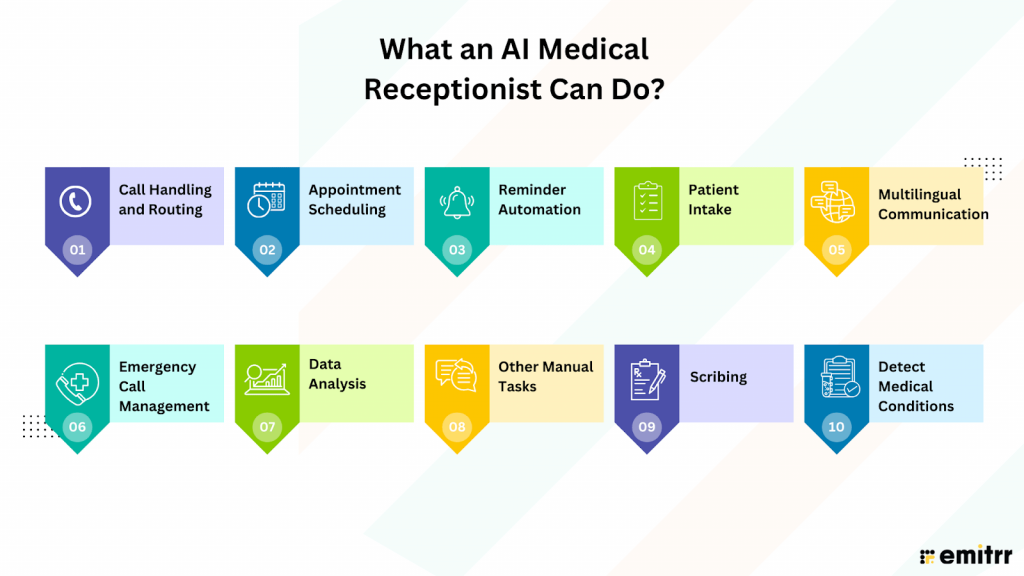
Call Handling and Routing
The AI receptionist automatically answers incoming calls and efficiently routes them to the correct department or staff member based on predefined criteria. This reduces wait times and ensures zero missed and abandoned calls.
Appointment Scheduling
When integrated with calendars and Electronic Health Record (EHR) systems, the medical receptionist AI can schedule appointments based on availability. It can also suggest appointment times, adjust schedules, and even reschedule if necessary.
Reminder Automation
The medical receptionist AI can send appointment reminders and follow-up notifications through various communication channels like calls, texts, or emails, ensuring patients are informed and reducing no-shows.
Patient Intake
The AI medical office assistant can collect and securely store patient information before their appointment. This includes demographic details, insurance information, and medical history, thus speeding up the check-in process and reducing administrative work.
Multilingual Communication
AI receptionists can communicate with patients in multiple languages, helping practices serve diverse patient demographics and ensuring clear communication with non-English-speaking patients.
Emergency Call Management
The medical receptionist AI is programmed to recognize signs of urgent medical needs. It prioritizes these calls and directs them to the appropriate healthcare provider, ensuring prompt attention for emergency cases.
Data Analysis
The AI receptionist system can track patient interactions, call volumes, and appointment patterns. This data can be analyzed to provide actionable insights to improve patient service, staffing decisions, and operational efficiency.
Other Manual Tasks
AI can update your Electronic Medical Records (EMR) with accurate information, such as medical codes and billing data. This reduces the risk of human error in administrative tasks.
Scribing
A good AI receptionist system can assist in note-taking during patient visits and automatically update patient charts, helping physicians focus on patient care without having to worry about manual documentation.
Detect Medical Conditions
While an AI Medical Receptionist cannot diagnose conditions, it can detect signs or symptoms mentioned by patients during the patient intake process. This data can then be flagged for further review by a healthcare professional.
Now here’s a breakdown of what an AI Reception service can not do:
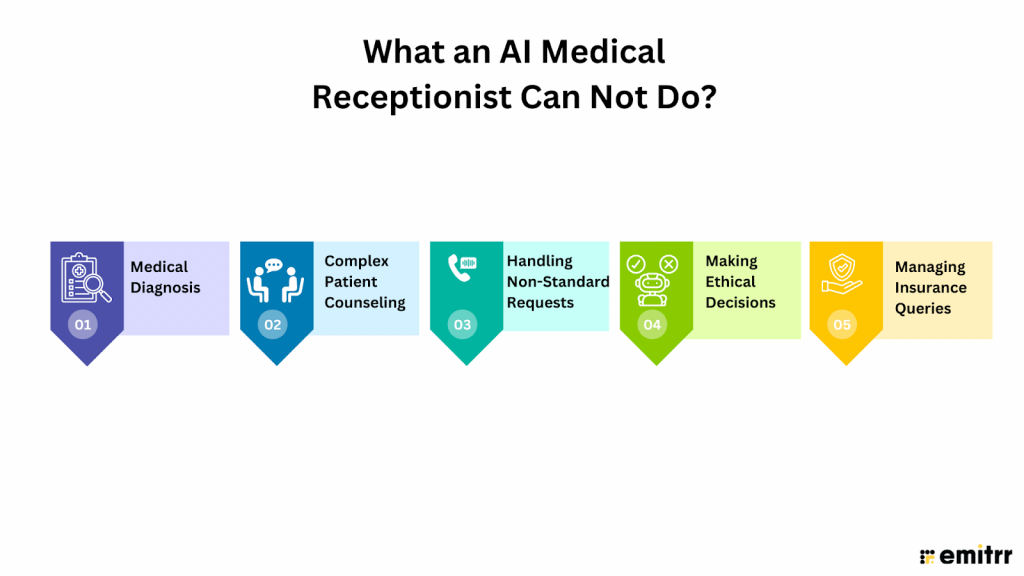
Medical Diagnosis
AI medical receptionists are not designed to diagnose medical conditions or provide treatment recommendations. Diagnosis requires clinical expertise that AI is not yet equipped to handle.
Complex Patient Counseling
AI cannot offer the emotional support or in-depth counseling that a human receptionist can provide. Complex situations, such as dealing with anxiety, grief, or providing comforting reassurance, are beyond the capabilities of an AI system.
Handling Non-Standard Requests
While AI can handle routine tasks efficiently, any requests that are unique, uncommon, or require a degree of human intuition may need to be escalated to a human receptionist or staff member.
Making Ethical Decisions
Healthcare often involves complex ethical decisions, such as matters of patient consent, confidentiality, or end-of-life care. AI does not have the capacity to make such nuanced ethical judgments, and these decisions require a human touch.
Managing Insurance Queries
Insurance-related inquiries can be highly complex and specific to individual policies. AI may be able to provide general information, but detailed knowledge of insurance plans, coverage, and claims often requires human expertise and understanding of healthcare regulations.
How to Choose the Best Virtual Medical Receptionist?
Choosing the best virtual medical receptionist for your practice is a significant decision that can transform how your front desk operates. Here are some important factors that you must evaluate to pick the best virtual receptionist for medical practice:
Budget and Cost Structure
Understanding your budget is crucial. The cost of an AI medical receptionist can vary, including initial setup, monthly subscription fees, and potential additional expenses like updates or customizations. While it’s tempting to go for the cheapest option, it’s essential to weigh the long-term value the solution brings to your practice. An investment in the right system can reduce operational costs over time, freeing up resources that can be better utilized elsewhere in the practice.
Key Features
When evaluating AI medical receptionist software solutions, key features like EHR (Electronic Health Records) Integration and being a HIPAA compliant virtual receptionist are non-negotiable. These features ensure that your patient data is handled securely and efficiently, adhering to all necessary healthcare regulations. The right AI system should seamlessly sync with your existing workflows, enhancing rather than complicating your processes.
Ease of Use for Staff and Patients
The transition to an AI medical receptionist software should be smooth for both staff and patients. A system with an intuitive interface can significantly reduce the time spent on training and onboarding. For patients, the experience should be straightforward and pleasant, minimizing frustration and improving their overall interaction with your practice. A user-friendly solution keeps both your staff and patients engaged and satisfied.
Multilingual & Multichannel Capabilities
Having an AI Medical Receptionist software that supports multiple languages can make a huge difference. It can give you ability to tackle patients who prefer to communicate in Spanish, Mandarin, or another language. Additionally, handling communication across various channels like phone, email, and text ensures that your patients can reach you in the way that’s most convenient for them.
Scalability for Growing Practices
As your practice grows, so should your AI system. The chosen solution must be scalable, adapting to increased patient volumes and additional services. A scalable system ensures that you won’t outgrow your investment, and it can continue to serve your needs as your practice expands.
Reputation and Customer Support
Researching reputation of the provider is essential. Look for vendors with a history of reliability, excellent customer service, and robust support systems. A vendor who provides ongoing updates and immediate support when issues arise is invaluable. Their reputation will often reflect their ability to deliver a product that works well and integrates smoothly into your practice.
Reviews
Learning from the experiences of similar medical practices can provide insightful information about the potential benefits and challenges of different AI systems. Reviews and case studies give you a practical understanding of how these systems perform in real-world settings.
Get ready-to-use voicemail greetings designed for medical practices. Download and set them up in minutes.

Why Emitrr is the best AI Receptionist for Medical Offices?
When considering these factors, Emitrr emerges as a leading option. This HIPAA-compliant virtual receptionist offers features like:
- Seamless EHR integration
- Multilingual support
- Conversational AI
- AI VoIP system
- 24/7 availability
- Context aware responses
- AI driven appointment scheduling & management
- And a reputation for reliability.
Emitrr effectively transforms the virtual front desk for medical practice by enhancing operational efficiency and patient satisfaction. With its proven track record and positive reviews from healthcare providers, it is an excellent option for practices looking to streamline their front desk operations while ensuring high-quality patient interactions. By carefully considering these factors and exploring reputable solutions like Emitrr, you can find an AI medical receptionist software that not only meets your current needs but also supports the long-term growth and success of your practice.

FAQs
On average, you can expect to pay anywhere from $100 to $500 per month for basic services, with more advanced systems, including integrations and customization, costing up to $1,000 or more per month.
Yes, AI medical receptionists are designed to be HIPAA-compliant. They follow strict security protocols to ensure the protection of patient information. These systems adhere to all healthcare privacy standards, ensuring that patient data is securely stored and transmitted, making them a safe and efficient solution for medical practices.
While AI medical receptionists can manage routine inquiries and scheduling tasks, handling complex patient queries may require human intervention. AI can assist with common questions, appointment bookings, and reminders, but when it comes to highly personalized medical issues, a human receptionist or healthcare professional may be needed to provide accurate responses.
Emitrr is arguably the best AI receptionist for medical office, as it allows them to handle patient calls or messages 24/7, it routes calls to the right department, automates responses to first-level queries, and more.
Yes, AI receptionists can handle multiple languages effectively, depending on the AI receptionist service you choose. Some service providers only offer bilingual virtual assistants, while tools like Emitrr support virtual receptionists that handle queries in multiple languages.
AI can reduce the workload of medical professionals by ensuring 24/7 availability to answer common patient queries, doing insurance verification, managing appointment scheduling, rescheduling, and cancellations, and carrying out other similar administrative tasks.
Conclusion
Switching to an AI medical receptionist software can transform your practice by streamlining front desk operations and enhancing patient interactions. From reducing wait times to managing after-hours inquiries, AI receptionists offer a range of benefits that help save time, money, and resources. While adopting AI technology might seem like a significant shift, partnering with a reliable provider like Emitrr ensures a smooth and compliant transition.
Why wait? Improve your front desk efficiency and provide better patient service today. Explore Emitrr’s HIPAA-compliant solutions and discover how they can revolutionize your practice. Let our team guide you through every step of the process for a seamless experience.

 4.9 (400+
reviews)
4.9 (400+
reviews)
